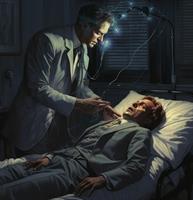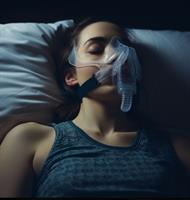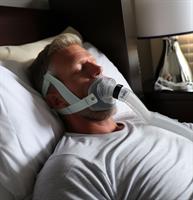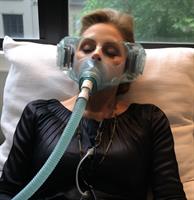Carrie Fisher, best known for her iconic role in the Star Wars franchise, tragically passed away in 2016 due to Carrie Fisher sleep apnea and other contributing factors. This event has since ignited a much-needed conversation on the dangers of sleep apnea and its links to mental health and drug addiction.
Join us as we delve into the factors surrounding Carrie Fisher’s death and the importance of raising awareness about sleep apnea, its treatment options, and the connection to mental health.
Key Takeaways
-
Carrie Fisher’s death has highlighted the risks associated with sleep apnea, emphasizing the importance of understanding and managing it.
-
The intersection between sleep apnea, mental illness, and drug addiction is essential for successful treatment.
-
Carrie Fisher’s advocacy has raised awareness about addressing sleep apnea in mental health treatments as well as safer alternatives such as oral appliances.
The Connection Between Carrie Fisher's Death and Sleep Apnea
Carrie Fisher’s untimely death on December 27, 2016, shocked fans worldwide. The beloved Star Wars actress, Carrie Fisher, died due to sleep apnea, a potentially serious sleep disorder characterized by episodes of cessation of breathing while sleeping, with other contributing factors.
Untreated severe sleep apnea can escalate into serious health complications and fatal consequences. The disorder can escalate the risk of conditions like heart failure, hypertension, diabetes, and stroke.
This heartbreaking incident illustrates how sleep apnea affected the life of a beloved public figure, who ultimately died, underscoring the significance of comprehending and managing this disorder.
Obstructive Sleep Apnea and Its Impact on Health
Obstructive sleep apnea is a widespread yet serious sleep disorder that repeatedly interrupts your breathing during sleep. Signs of sleep apnea include:
-
Loud snoring
-
Episodes of breathing cessation during sleep
-
Exhaustion
-
Daytime drowsiness
This disorder can negatively influence overall health, given its association with:
-
hypertension
-
stroke
-
cardiac insufficiency
-
diabetes
-
depression
Research indicates that individuals with sleep apnea are more likely to acquire atherosclerotic heart disease, a condition in which plaque accumulates in the arteries and can result in heart attack or stroke.
Atherosclerotic Heart Disease and Multiple Drug Intake
The Los Angeles County Coroner’s report, released by the Los Angeles County Coroner, revealed that atherosclerotic heart disease and multiple drug intake were identified as contributing factors to Carrie Fisher’s passing. The accumulation of fatty tissue in the walls of her arteries and the ingestion of multiple drugs, including cocaine, methadone, MDMA (ecstasy), alcohol, and opiates, had a detrimental effect on her health. (source)
This heartbreaking incident emphasizes the need to confront sleep apnea and its possible health impact, as both sleep apnea and atherosclerotic heart disease were noted as immediate causes of her death, along with other undetermined factors.
The Intersection of Sleep Apnea, Mental Illness, and Drug Addiction
Sleep apnea, mental illness, and drug addiction often intersect, as exemplified by Carrie Fisher’s life and her commitment to mental health programs. Sleep apnea can result in depression, anxiety, and other mental health problems due to insufficient restful sleep.
Mental illness can also affect sleep hygiene, which can consequently lead to sleep apnea. Similarly, drug addiction can result in a lack of good sleep hygiene, which can cause sleep apnea.
Comprehending these linkages is key in tackling the intricacies of mental health and addiction treatment.
Carrie Fisher's Advocacy for Mental Health Programs
Carrie Fisher fervently championed mental health awareness and treatment. She openly discussed her own experiences with bipolar disorder, addiction, and body dysmorphia, working tirelessly to challenge the stigma surrounding mental health. Her advocacy emphasized the need to eliminate the stigma associated with mental illness and ensure that individuals receive the optimal care, whether in Los Angeles or any other location.
This includes addressing sleep apnea as part of comprehensive mental health treatment.
The Importance of Addressing Sleep Apnea in Mental Health Treatment
Sleep apnea can greatly influence mental health conditions and has potential to result in drug addiction. It can cause fatigue, irritability, and concentration difficulties, which can intensify existing mental health conditions.
Sleep deprivation resulting from sleep apnea can elevate the probability of drug addiction, as individuals may use drugs to manage exhaustion and other effects of sleep deprivation.
Carrie Fisher’s brother, Todd Fisher, has also spoken about the importance of addressing sleep apnea in relation to drug addiction, especially in cases like when a mom battled drug addiction.
Hence, tackling sleep apnea forms a critical part of mental health treatment.
Sleep Apnea Treatment Options and Their Risks
There are several treatment alternatives for sleep apnea, with CPAP therapy being the most commonly utilized. CPAP therapy involves wearing a mask over the nose and mouth while sleeping, connected to a machine that pumps air into the lungs to maintain an open airway.
Despite its effectiveness, CPAP therapy can have potential risks, such as skin irritation, nasal congestion, and dry mouth. If you suffer from sleep apnea, checkout the best CPAP machines.
An alternative treatment for sleep apnea is oral appliance therapy, which involves wearing a custom-made mouthpiece while sleeping to assist in maintaining an open airway by shifting the lower jaw forward.
>> Check out Top Rated ResMed AirSense 11 - CPAP Machine! <<
Oral Sleep Appliances as a Safer Alternative
Compared to traditional CPAP machines, oral sleep appliances provide a more comfortable and less hazardous treatment alternative for sleep apnea. These custom-made mouthpieces work by slightly repositioning the jaw and enlarging the airways, making them less intrusive than CPAP machines.
However, they may not be as effective in treating more severe cases of sleep apnea. Oral sleep appliances are also more portable and simpler to take with you when traveling, offering a convenient solution for those seeking relief from sleep apnea without the discomfort of a CPAP machine.
Celebrities and Sleep Apnea: Raising Awareness
Carrie Fisher’s demise significantly heightened awareness about sleep apnea and the need for treatment, not just in Los Angeles County, but globally as well.
Other celebrities with sleep apnea include:
-
Shaquille O’Neal
-
Amy Poehler
-
Shonda Rhimes
-
William Shatner
-
Reggie White
Their experiences and advocacy can contribute to increasing public knowledge regarding sleep apnea and the need for improved treatment alternatives.
The Impact of Carrie Fisher's Death on Sleep Apnea Awareness
The devastating loss of Carrie Fisher has significantly contributed to increasing awareness about sleep apnea and its possible risks. This increased awareness highlights the necessity of identifying the signs and symptoms of sleep apnea and taking necessary steps towards treatment before it escalates into a serious health issue.
Celebrities can have a profound impact on public perception and knowledge, and in this case, Carrie Fisher’s death serves as a poignant reminder of the importance of addressing sleep apnea and its connection to mental health and addiction.
Summary
Carrie Fisher’s death due to sleep apnea, along with other contributing factors, has sparked a vital conversation about the importance of recognizing and treating this serious condition. Her life and advocacy have shed light on the complexities of sleep apnea’s intersection with mental health and addiction. As we continue to raise awareness and seek effective treatment options, it is crucial to remember the impact that sleep apnea can have on our overall health and well-being, and the importance of addressing it as part of comprehensive mental health treatment.
Frequently Asked Questions
Did Carrie Fisher know she had sleep apnea?
It's unclear if Carrie Fisher even knew she had sleep apnea, which is common among 25 million Americans. One study estimated that one in four adults between 30 and 70 years old has mild to severe sleep apnea, making it likely that Fisher did have it.
What is the life expectancy of someone with sleep apnea?
People with sleep apnea have a life expectancy of 8-18 years if they develop the disorder before the age of fifty.
Which famous people have sleep apnea?
Shaquille O'Neal, Amy Poehler, Carrie Fisher, Shonda Rhimes, Tony Robbins, and Rosie O'Donnell are some of the celebrities who have shared their experiences with sleep apnea.
Does Shaq still have sleep apnea?
Shaq does still suffer from sleep apnea and is using a sleep machine to help mitigate the risks associated with the disorder.
What are the signs and symptoms of sleep apnea?
Common signs and symptoms of sleep apnea include loud snoring, episodes of breathing cessation during sleep, exhaustion, and daytime drowsiness.






